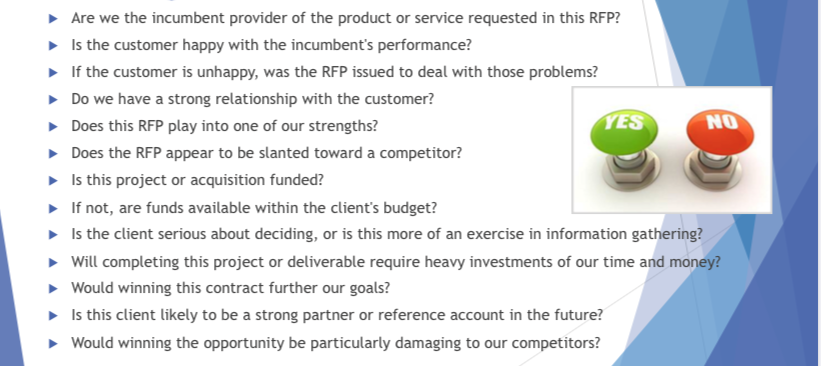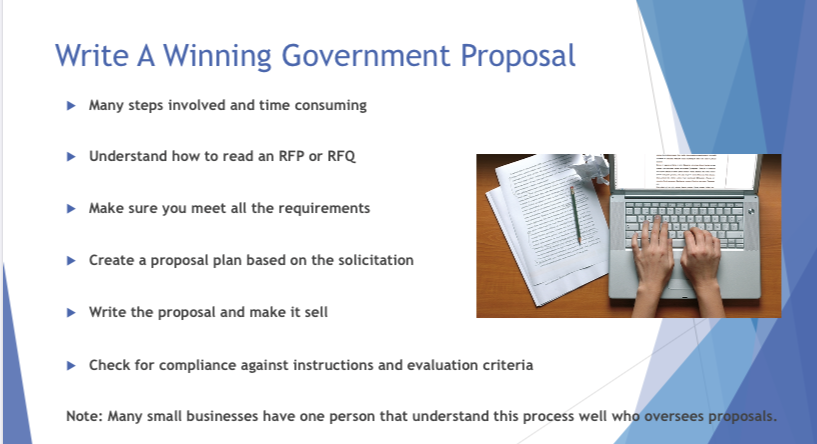Ready to write your proposal for a government contracting opportunity? Florida SBDC at FIU assembled a group of experts to share some advice for small businesses – and war stories – about bidding for and winning government contracts, whether it is for local, state or federal work.
Earlier this week, Growbiz shared some advice for determining whether government contracting is right for your business and getting yourself organized for the process. It’s very important to have a game plan, which includes identifying the current status of your business, identifying opportunities, being organized, building relationships and staying in your lane, the experts said. A big part of this is networking: get to know the contracting officers and go to their matchmaking events and industry days and ask questions. Find that post here. Today, we’ll look closer at the proposal process.
Make no mistake: It will be time-consuming, said Orlando Espinosa of Emineo Media, who led the conversation that included Jonel Hein, Deputy District Director for the South Florida District of the Small Business Administration and Karen Vieira of The Med Writers during an SBDC at FIU Webinar called “Writing a Winning Government Proposal” (available for viewing on YouTube). Both Espinosa and Vieira have successfully won a number of government contracts.
“If you want to jump into federal contracting, whether federal, state or local, you’ve got to be very well researched and you have to know what is expected of you,” adds Hein.
MAKE A PLAN.
And, she said, you need to have a plan with a targeted approach, Hein said. If you are new to the process, get help from organizations such as Florida SBDCs and PTACs (Procurement Technical Assistance Center) so you can learn whether it is something you should actually do, she said. In Miami-Dade and Monroe, Florida SBDC at FIU, the small business development center within FIU’s College of Business, and PTAC have helped hundreds of small business owners pursuing government contracting with no-cost consulting services. The SBA also lists a number of resources on its website.
You’ve got to make a plan because otherwise you are going to be chasing down rabbit holes where you are not going to have the most traction, Hein warned.
Some people slash their prices too much in order to get their first contract, and creates potential losses and a bad experience for them. “And if you get a rating from the agency that is not favorable to you, it can hurt you down the road,” she said.
As part of your research, you can request the winning bid from the last time the contract was awarded, she said.
Here are some more of their top tips:
GO OR NO GO?
To decide whether to pursue a contract, go to the RFP – which can run 100 pages or more – and zero in on sections C, L and M, reading them carefully and thoroughly. Section C will identify the work they need, Section L will give you instructions on exactly what they require in the proposal, and section M gives the evaluation criteria. Do you think you will score high based on that criteria? Be honest with yourself.
“You have to assess does it make sense to go after this,” Vieira said. “ I see too many contracts where companies spend hours or days, weeks or months preparing proposals but they didn’t have a chance to it.”
Vieira also has a set of questions she asks herself when considering a proposal:
 If you decide to bid, read the whole RFP carefully and thoroughly. Use a highlighter or take good notes.
If you decide to bid, read the whole RFP carefully and thoroughly. Use a highlighter or take good notes.
“The instructions will tell you exactly what they want. And then you have to go through it with a fine tooth comb and find every detail and follow it exactly. This is where everybody drops the ball,” said Vieira.
Use those sections L and M to help form your outline for your proposal.
FOLLOW THE INSTRUCTIONS EXACTLY.
You won’t win if you turn your proposal in late – or if it is longer than the page limit. Don’t be excluded on a technicality.
Follow submission instructions in Section L exactly. Make sure your proposal is submitted by email or mail correctly – whichever way the government wants it – down to the correct words in the subject line. Pay attention to the number of copies, packaging, etc.
Use the instructions as your outline. As you put together your proposal, don’t reinvent the wheel. Also, use the language the government uses in the RFP: the numbering and the topics and titles, Vieira advises. Have a subheading in your proposal to match all the requirements. Follow the rules for font, margins, size, spacing, etc.
Make sure you are compliant with all requirements – licenses, insurance, etc.
SELL YOURSELF!
“What you are trying to do with the proposal is to solve a problem the government is having. You have to be able to brag about yourself and differentiate yourself from everyone else that will be bidding on the project. You need to know who your competitors are,” said Hein.
Vieira adds: “You have to push yourself, you have to stand out, you have to look different, be different, and show how you are going to do this this contract and it is going to be so hands off for them. Put yourself in their shoes, this is you selling them… it needs to be persuasive, it needs to be attractive, it needs to be compelling. And what makes it attractive, persuasive and compelling is details. If you have the space, and can go deeper go deeper (but don’t exceed the page limit given),”
And when you talk about relevant past performances, it goes beyond what you have done for the government, said Espinosa. “When you talk about past performances, your career and the things you have done in the private sector, you have to figure out how you tie that all together.”
Find all these tips and many more in the Writing a Winning Government Proposal Webinar here:
And for many more tips and tricks by small business owners who have been there, done that, listen to the The Government is Still Buying Webinar here.
A closing tip from Hein: If you did get evaluated and you did not win, you can always ask for a debrief — and you always should — to find out what it is about your proposal that didn’t meet the requirements. “It also gets you in front of the contracting officer — they get to know who you are. It’s another opportunity to market yourself and you’ve gone the extra mile to find out why it didn’t work. And you are probably going to submit a better proposal next time.”
 Read more about government contracting on GrowBiz:
Read more about government contracting on GrowBiz:
BEEN THERE, DONE THAT: SMALL BUSINESS OWNERS SHARE GOVERNMENT CONTRACTING TIPS
GOVERNMENT CONTRACTING: TIPS FROM A SMALL BUSINESS IN THE TRENCHES
HOW TO FIND FEDERAL GOVERNMENT CONTRACTING OPPORTUNITIES
IS YOUR BUSINESS READY FOR GOVERNMENT CONTRACTING?
FEDERAL CONTRACTING: GETTING YOUR FOOT IN THE DOOR
FOR NICHE SMALL BUSINESSES WILLING TO WORK HARD, GOVERNMENT CONTRACTING CAN OPEN DOORS
DOING BUSINESS WITH LOCAL AND STATE GOVERNMENTS: THE PROS AND CONS
Please send GrowBiz topic suggestions and feedback to GrowBiz@FIU.EDU.

